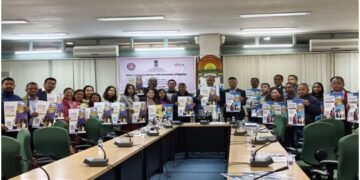“This article echoes the concerns of countless recent and aspiring graduates that are driven by a shared desire for growth, innovation, and a meaningful impact. And I hope it compels everyone to pause, reflect, and act upon.”
As fresh graduates step out to join the vibrant workforce and explore professional growth and career, the majority of them are made to face a significant mountain standing tall between them and their probable future; the daunting ‘experience gap’. Despite having strong academic records, certifications, and a positive enthusiasm to work, many find themselves lacking the hands-on experience that employers demand for most job openings.
This current practice of hiring only fresh employees with experience seems to portray that the government and employers do not consider that fresh graduates also need to start somewhere. If government institutions and employers do not facilitate avenues for fresh graduates to gain experiences in the ongoing approach of recruitment, the crises of managing recruitment and the perception of graduates as ineligible applicants will continue to be lived as normality.
And the question of how can fresh graduates gain the experience needed will remain unanswered and unaddressed, especially in developing countries like ours where government support and opportunities are still inadequate. In regions such as Meghalaya, characterised by its geographical features as being a land-locked area with limited industrial presence for employment opportunities and an inclining unemployment rate, if the government does not intervene by exploring feasible employment opportunities as a vital option, the situation will become even more intensified with rising unemployment rates, a surplus of graduates, and a fiercely competitive economy.
Looking at the current job landscape in the realm of Meghalaya; many employers, especially in the public sector, focus severely on formal qualifications with a minimum of three years’ experience while frequently neglecting other important experiences such as academic projects, supplementary courses, and internships. This practice poses a considerable challenge for recent graduates lacking extensive work experience but who have nonetheless developed important skills through alternate avenues.
It is imperative for employers to also understand that the requirement of possessing a specific degree and experience often narrows the assessment of a candidate’s potential. Employers need to acknowledge that practical experiences and varied qualifications provide valuable insights into a candidate’s abilities. By appreciating a wider array of qualifications, employers could draw in a more diverse and innovative talent pool ultimately benefiting both their organisations and the job market overall.
While it’s important to focus on formal qualifications, there is a growing need for a broader perspective that considers all of a candidate’s capabilities apart from the experiences. If the government cannot efficiently provide adequate opportunities for recent graduates to gain work experience, then the requirement of having a minimum experience for a job offer goes on to project that the employing institutions are established only for the experienced with no room for the inexperienced lot.
This piece on ‘the experience gap’ voices the concern of the multiplying number of graduates, particularly in areas with limited job availability, like ours. As these young professionals are thrilled to join the workforce with enthusiasm, they often face competition from individuals with greater practical experience, thus hindering their chances of obtaining roles in their desired fields.
Government institutions in particular and employers in general undoubtedly play a crucial role in reflecting and taking a gauge of these uprising issues that have not been addressed and pursued in establishing a favourable environment for employment and skill development. However, exploring the effectiveness of current policies aimed at bridging the experience gap may prove to be fruitful. We are also required to understand if these initiatives genuinely facilitate a seamless transition for fresh graduates into the job market, or do they require enhancements.
Additionally, with the increasing diversity and specialisation within educational programs, it is pertinent to evaluate whether the government is adequately acknowledging and supporting the wide range of subjects provided in academic institutions. Are there proactive steps taken to guarantee that all fields of study — regardless of their current popularity — are valued and properly resourced? Maintaining an ongoing dialogue regarding how various academic disciplines are perceived and supported at the government level is essential. Subjects that may not be broadly recognised could still impart critical skills and knowledge relevant to specific industries.
Consequently, the government must pursue to bridge the experience gap by providing fresh graduates with hands-on opportunities that go beyond mere experience. It’s essential to create programmes that equip graduates with practical skills that are relevant to today’s job market. By doing so, we can help graduates transition smoothly into meaningful employment and support economic growth.
Furthermore, it’s immediately crucial for the government to review government policies on job and experience (if there is any at present) on the effectiveness of the policy in addressing the experience gap. If such a policy on job and experience is non-existent, then the same needs to be enacted to be referred to by the employing institutions as a guiding document for the benefit of unemployed graduates and future graduates.
Ensuring that every subject receives the recognition and support it warrants, we can build a more inclusive and flexible job market that ultimately benefits both graduates and the wider economy. Immediate measures and collaborative efforts are required to tackle these issues and create pathways to significant employment for the skilled youth of Meghalaya waiting to be employed.
In conclusion, I on behalf of the unemployed graduates, fresh graduates, and aspiring graduates voice out this concern of ‘the experience gap’ with a motive to shape the current perception, practice, and trends of hiring only individuals with experience.
Thus, like a clarion call, I suggest that the government institutions and employers give the inexperienced an opportunity to gain the experience required and also to alternatively consider mentoring and training on the job; which is widely being applied by other states of the country as a possible route in addressing the vastly growing number of youth with unemployment and inexperienced.

























